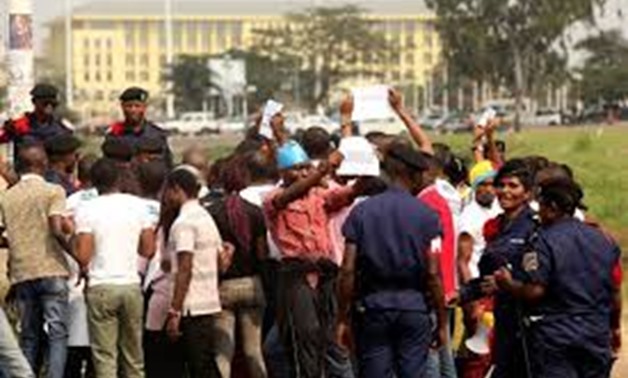
Congolese police detain protestors demanding that President Joseph Kabila leave power by the end of the year in Kinshasa, Democratic Republic of Congo, July 31, 2017. Picture taken July 31, 2017. REUTERS/Kenny Katombe
KINSHASA– 16 October 2017: Poverty, mistrust in banks and a deepening economic crisis have turned the capital of Democratic Republic of Congo into the world’s worst megacity when it comes to economic opportunities for women, a poll found on Monday.
The Thomson Reuters Foundation asked 380 experts on women’s issues in 19 megacities several questions, including if women in their city had access to economic resources such as education, land, and financial services such as bank accounts and loans.
On economic opportunities Kinshasa came out as the worst of the megacities - all of which have populations of more than 10 million - followed by Cairo and Karachi. By contrast London was named as the best, followed by Shanghai.
Experts said most women in Kinshasa work in small, informal businesses or agriculture - sectors often cut off from banking - and many live on the city outskirts without electricity and roads, making it hard to travel to banks.
“These two sectors - small businesses and agriculture - occupy more than 80 percent of women but these are risky activities according to financial institutions,” said Scolastique Mahindo, a representative of U.N. Women in Congo.
Figures from a 2014 World Bank survey found less than a quarter of women in Africa’s second largest country use financial services, compared with four in 10 men.
ALTERNATIVE FINANCE
Girls often miss out on education due to forced marriage, child labour and poverty, with only six in 10 girls completing primary school, compared to eight out of 10 boys, UNICEF says.
Wanet Amba of the National Federation of Small and Medium Enterprises of Congo (FENAPEC) said access to financial services tended to require administrative procedures and legal documents that are out-of-reach for many women in Kinshasa.
But some women, such as Magalie Mbombo, get around this by being part of a local savings and loans association.
Mbombo has worked as a market trader for almost two decades without ever dealing with a bank and her business has thrived.
Common across Africa, such cooperative schemes - which see members put in money and take turns to claim the pot - allow people who cannot obtain credit to finance their projects.
“If I save $1,000 in a bank, I will not even get $100 in interest,” Mbombo said. “I have seen some traders flee the market because they could not afford to pay back their credit.”
Once such schemes reach a certain size, they can attract the eye of microfinance institutions, which give small loans to the poor, along with financial services such as savings accounts, training and peer support, which particularly benefits women.
“We owe our expansion to the women who succeeded in small businesses and have become today’s big traders,” said Mamie Kalonda, head of FINCA Congo, the country’s largest microfinance institution with about 400,000 members, most of them women.
Yet persuading women to invest their hard-earned cash is a challenge as Congo’s deepening economic crisis bites hard, said Rosine Nzumba, manager of a women-run cooperative in Kinshasa.
“The poor financial inclusion of women in Kinshasa is a result of poverty,” said Nzumba.
The government says it is trying to get more women involved in the economy, setting up a microfinance fund in 2013 and recently a financial education program.
Yet with 98 percent of Congo’s money in the hands of individuals rather than in the banking system, such efforts will take time, said central bank governor Déogratias Mutombo.
“It must be corrected by changing (this) behaviour (of hoarding money),” he told the Thomson Reuters Foundation.
The survey was conducted online and by phone between June 1 and July 28, with 20 experts questioned in all 19 cities. The results were based on a minimum of 15 experts in each city..


Comments
Leave a Comment